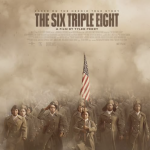The story of Claressa ‘T-Rex’ Shields, a boxer from Flint, Michigan who trained to become the first woman in her country’s history to win an Olympic gold medal in the sport.
Chuck says:
Claressa “T-Rex” Shields is a trailblazer you probably never heard of. The only boxer to win a gold medal in consecutive Olympic Games, she advocated for other female fighters, demanding they the same opportunities, facilities and endorsements as their male counterparts. In some ways, it’s a fight she’s still fighting today.
Rachel Morrison’s “The Fire Inside” charts Shields’ rise through the ranks of amateur boxing as well as her struggles to get the recognition due her and her peers. Sporting a ragged aesthetic and raw performances, there’s a grit to the film that serves it well, a reflection of the tattered environment Shields came from as well her take-no-prisoners approach to life.
From an early age, Shields (Ryan Destiny) displays a desire to escape. Though not welcome at a local gym, she persists in showing up, hoping to get boxing lessons. Coach Jason Crutchfield (Brian Tyree Henry) takes pity on her, giving her a few pointers but in the process recognizes that she may have potential. Nurturing this, he develops her into a formidable fighter who shows her mettle at the 2012 National Championship. At 16, she defeated the 31-year-old champion.
For the most part, screenwriter Barry Jenkins succeeds in injecting a bit of life into the sports film formula. Obviously, sequences devoted to arduous training and decisive victories, are inescapable but those are effectively balanced with scenes devoted to Shields troubling home life. From a broken family in Flint, Michigan, she was sexually abused at a young age, her negligent mother more of a child than she. In some ways, her success makes things worse as her mother begins to lean on her financially, as do her younger siblings, her teen sister giving birth at 15.
The burden of having to support them all only exacerbates her frustration. Though Crutchfield assures her that endorsement deals will be waiting for her when she from the 2012 Olympics, all she finds are cold shoulders from would be supporters. While the coach has the best of intentions, he simply does not have the connections necessary to get Nike, Adidas and their rivals’ attention. What emerges is a story focused more on social injustice rather than sports cliches and the film is better for it as her fight for equal footing outside the ring becomes the narrative catalyst.
While the fact that Shields is black, and from Flint no less, works against her, her demeanor does her no favors either. Admitting in the press that she likes to beat her opponents up repels would be endorsers, the young girl not savvy enough to play the media game. That we come to admire her is thanks to the humanity Destiny displays. The young actress’ fierce approach keeps us in her corner throughout.
In the end, the sense of realism, created by Destiny and Henry’s fine performances, Jenkins’ unsentimental approach and Morrison’s drab, unadorned mise en scene, is what separates “Fire” from other genre entries. Far more than a “Rocky” rip-off, this gives us a complete picture of all Shields has to contend with, her greatest fights being those outside the ring against a foe far greater than just another up-and-coming fighter.
3 Stars




